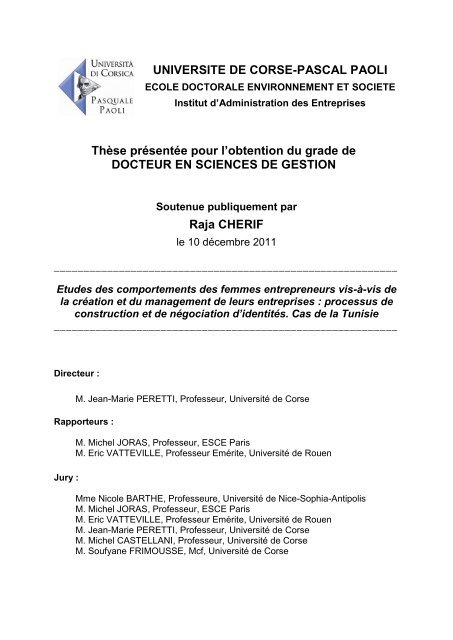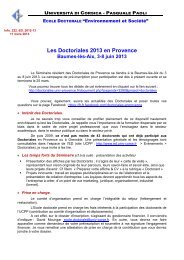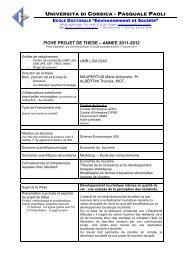Soutenance de Raja Cherif
Soutenance de Raja Cherif
Soutenance de Raja Cherif
You also want an ePaper? Increase the reach of your titles
YUMPU automatically turns print PDFs into web optimized ePapers that Google loves.
UNIVERSITE DE CORSE-PASCAL PAOLI<br />
ECOLE DOCTORALE ENVIRONNEMENT ET SOCIETE<br />
Institut d’Administration <strong>de</strong>s Entreprises<br />
Thèse présentée pour l’obtention du gra<strong>de</strong> <strong>de</strong><br />
DOCTEUR EN SCIENCES DE GESTION<br />
Soutenue publiquement par<br />
<strong>Raja</strong> CHERIF<br />
le 10 décembre 2011<br />
__________________________________________________________<br />
Etu<strong>de</strong>s <strong>de</strong>s comportements <strong>de</strong>s femmes entrepreneurs vis-à-vis <strong>de</strong><br />
la création et du management <strong>de</strong> leurs entreprises : processus <strong>de</strong><br />
construction et <strong>de</strong> négociation d’i<strong>de</strong>ntités. Cas <strong>de</strong> la Tunisie<br />
__________________________________________________________<br />
Directeur :<br />
M. Jean-Marie PERETTI, Professeur, Université <strong>de</strong> Corse<br />
Rapporteurs :<br />
Jury :<br />
M. Michel JORAS, Professeur, ESCE Paris<br />
M. Eric VATTEVILLE, Professeur Emérite, Université <strong>de</strong> Rouen<br />
Mme Nicole BARTHE, Professeure, Université <strong>de</strong> Nice-Sophia-Antipolis<br />
M. Michel JORAS, Professeur, ESCE Paris<br />
M. Eric VATTEVILLE, Professeur Emérite, Université <strong>de</strong> Rouen<br />
M. Jean-Marie PERETTI, Professeur, Université <strong>de</strong> Corse<br />
M. Michel CASTELLANI, Professeur, Université <strong>de</strong> Corse<br />
M. Soufyane FRIMOUSSE, Mcf, Université <strong>de</strong> Corse
RESUME<br />
La pertinence <strong>de</strong> faire une étu<strong>de</strong> sur les femmes entrepreneurs tient à l’ampleur <strong>de</strong><br />
l’entrepreneuriat féminin. Cette recherche est une contribution à la compréhension du<br />
comportement <strong>de</strong>s femmes entrepreneurs vis-à-vis <strong>de</strong> la création et du management<br />
<strong>de</strong> leurs entreprises, en particulier dans le contexte tunisien. L’entrée massive <strong>de</strong>s<br />
femmes entrepreneurs dans le mon<strong>de</strong> <strong>de</strong>s affaires soulève la question <strong>de</strong> leur<br />
insertion dans le milieu <strong>de</strong>s affaires. Quels sont les comportements <strong>de</strong>s femmes<br />
entrepreneurs vis-à-vis <strong>de</strong> la création et du management <strong>de</strong> leurs entreprises ? Ontelles<br />
<strong>de</strong>s comportements spécifiques pour s’insérer dans le milieu <strong>de</strong>s affaires ? Une<br />
revue <strong>de</strong> la littérature montre que la majorité <strong>de</strong> la recherche pose la problématique<br />
<strong>de</strong> l’entrepreneuriat féminin en termes <strong>de</strong> différences ou <strong>de</strong> similitu<strong>de</strong>s entre les<br />
hommes et les femmes entrepreneurs et leurs entreprises. Dans cette perspective<br />
comparative, il existe <strong>de</strong>ux approches <strong>de</strong>s comportements <strong>de</strong>s femmes<br />
entrepreneurs : l’approche féminine pour laquelle les femmes abor<strong>de</strong>nt les affaires<br />
<strong>de</strong> façon différente <strong>de</strong> leurs homologues masculins et l’approche entrepreneuriale qui<br />
repose sur l’esprit d’initiative économique et qui considère que les entrepreneurs <strong>de</strong>s<br />
<strong>de</strong>ux sexes ont la même perception et les mêmes comportements en affaires. Des<br />
entretiens qualitatifs conduits à titre exploratoire auprès <strong>de</strong> 18 femmes entrepreneurs<br />
en Tunisie laissent entrevoir que leurs comportements ne sont ni typiquement<br />
masculins, ni typiquement féminins. Ces comportements sont plutôt hybri<strong>de</strong>s. Ces<br />
résultats conduisent à s’interroger sur l’intérêt <strong>de</strong> la perspective comparative qui<br />
recherche <strong>de</strong>s différences spécifiques entre les hommes et les femmes<br />
entrepreneurs, d’autant plus que la revue <strong>de</strong> la littérature sur l’entrepreneuriat féminin<br />
laisse place à un regard critique sur cette perspective comparative : les étu<strong>de</strong>s<br />
empiriques produisent <strong>de</strong>s conclusions différentiées voire contradictoires. C’est dans<br />
le but <strong>de</strong> clarifier le débat qui tourne autour du rapport du sexe et du comportement<br />
<strong>de</strong>s femmes entrepreneurs que ce travail propose une étu<strong>de</strong> compréhensive <strong>de</strong><br />
l’entrepreneuriat féminin en Tunisie. L’analyse <strong>de</strong>s résultats d’entretiens qualitatifs<br />
réalisés en profon<strong>de</strong>ur auprès <strong>de</strong> 18 femmes entrepreneurs montre la diversité <strong>de</strong><br />
l’entrepreneuriat féminin en Tunisie. Cette analyse lève le voile sur la nature hybri<strong>de</strong><br />
<strong>de</strong>s comportements <strong>de</strong>s femmes entrepreneurs vis-à-vis <strong>de</strong> la création et du<br />
management <strong>de</strong> leurs entreprises et montre que leur insertion dans le milieu <strong>de</strong>s<br />
affaires passe par <strong>de</strong>s processus <strong>de</strong> construction et <strong>de</strong> négociation d’i<strong>de</strong>ntités.<br />
MOTS-CLÉS : Entrepreneuriat Féminin, Femmes Entrepreneurs en Tunisie,<br />
Comportements vis-à vis du Management et <strong>de</strong> la Création d’Entreprises,<br />
Construction d’I<strong>de</strong>ntité, Insertion dans le Milieu <strong>de</strong>s Affaires.
ABSTRACT<br />
The relevance of a study on women entrepreneurs is the extent of female<br />
entrepreneurship. This research is a contribution to un<strong>de</strong>rstanding the behavior of<br />
women entrepreneurs about management and business creation, in particular in the<br />
Tunisian context. The massive entry of women entrepreneurs in the business world<br />
raises the question of their integration into the business. A review of the literature<br />
shows that the majority of research raises the issue of female entrepreneurship in<br />
terms of differences or similarities between men and women entrepreneurs and their<br />
businesses. In this comparative perspective, there are two approaches to behavior of<br />
women entrepreneurs: a feminist approach for which the women approach the<br />
business differently from their male counterparts and an entrepreneurial approach<br />
that consi<strong>de</strong>rs that the entrepreneurs of both sexes have the same perception and<br />
the same behavior in business. In an exploratory study, qualitative interviews<br />
conducted with 18 women entrepreneurs in Tunisia suggest that their behaviors are<br />
not typically male, nor typically female but they are rather hybrids. These results raise<br />
questions about the interest of the comparative perspective that looks for specific<br />
differences between men and women entrepreneurs, especially since the review of<br />
the literature on female entrepreneurship leaves place to a critical look on this<br />
comparative perspective with empirical studies that produce differentiated or even<br />
contradictory conclusions. The objective of this research is to clarify the <strong>de</strong>bate that<br />
turns around the relationship of the sex and the behavior of women entrepreneurs. It<br />
proposes a comprehensive study of female entrepreneurship in Tunisia. Analysis of<br />
the results of qualitative interviews achieved in <strong>de</strong>pth by 18 women entrepreneurs<br />
shows the diversity of women's entrepreneurship in Tunisia, unveils the hybrid nature<br />
of the behavior of women entrepreneurs about management and business creation<br />
and finds that their integration in the business community is through processes of<br />
construction and negotiation of their entrepreneur's i<strong>de</strong>ntity.<br />
KEYWORDS : Women Entrepreneurship, Women Entrepreneurs in Tunisia, Behavior<br />
about Management and Business Creation, Construction of I<strong>de</strong>ntity, Integration in the<br />
Business.

















